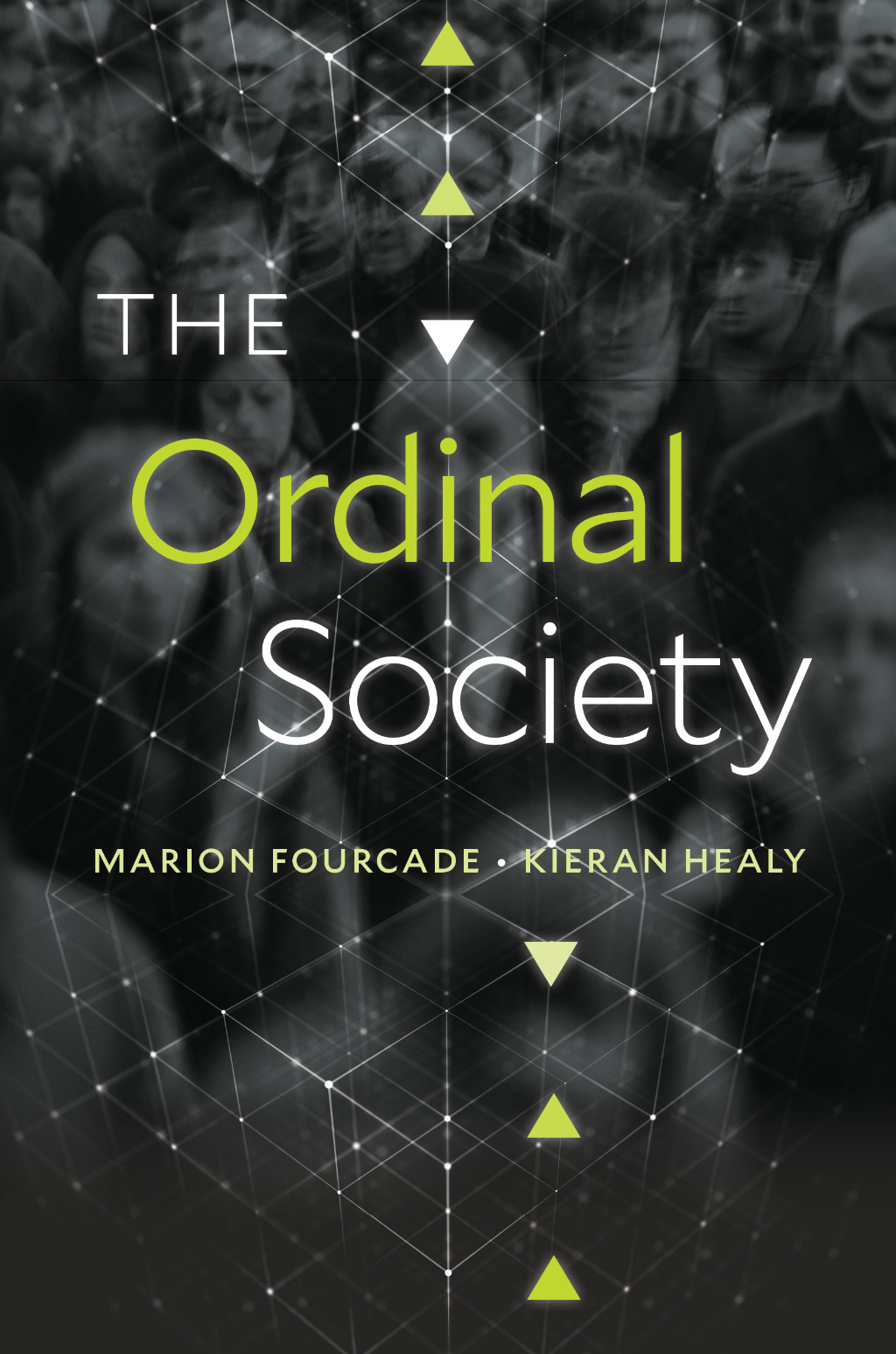Marion Fourcade and Kieran Healy, The Ordinal Society. Harvard University Press.
Buy on AmazonOr buy from Bookshop.org | from Barnes & Noble | from Amazon UK
The Ordinal Society is an argument about how digital capitalism is reformatting the world. Read the table of contents and the first twenty pages (PDF).

Endorsements
“The Ordinal Society will enter the pantheon, both as a work of cross-cutting social theory and as a clear-eyed reflection on the stakes of digital technology. Marshaling an astonishing range of theoretical and empirical knowledge to build their argument, Fourcade and Healy compellingly demonstrate just how integral measurement and ranking have become to markets, politics, culture, and the very fabric of social life. And they manage to do it with both rigor and style; this book is both intellectually rewarding and a true pleasure to read.” —Karen Levy, author of Data Driven
“This groundbreaking and revelatory book illuminates the seismic social changes provoked by the ubiquity of data. Marion Fourcade and Kieran Healy show how in this new ordinal society, where everything and everyone is ranked, social stratification is created, codified, and in the end legitimized like never before. Far-reaching and deeply researched, this is an absolute must-read for anyone who wants to understand inequality in the twenty-first century.” —Gabriel Zucman, coauthor of The Triumph of Injustice
“If any work can advance contemporary social theory for our age of AI and bring it to a wide audience, it is The Ordinal Society. With the elegant theory of ordinality as a common thread uniting disparate phenomena, Fourcade and Healy sort out key paradoxes of digitality, particularly the way in which computation simultaneously promotes democratization and hierarchy. This important book deserves to have a lasting influence in sociology and beyond.” —Frank Pasquale, author of The Black Box Society
“An incisive, crystalline account of how the tracking and scoring of personal data has come to modulate contemporary existence—not only its dreary routines, creepy supervisions, and troublesome extractions and biases, but also its experiences of delight, connection, and effervescence. Essential reading for understanding the hold of digital ordering on our world, and for thinking up ways to loosen its grip." —Natasha Schüll, author of Addiction by Design
“With precision and eloquence, Healy and Fourcade map the tectonic forces driving the digitization of everyday life. If you want to know where the fault lines are—and how they got there—read this book.” —Fred Turner, author of From Counterculture to Cyberculture
“Under digital capitalism, social interaction itself has become the target of private appropriation and capital accumulation. Marion Fourcade and Kieran Healy show how sociality has been corralled and monetized in the ordinal society—a society that may soon prove to be unbearable to most. A must-read.” —Thomas Piketty, author of A Brief History of Equality
Summary
Over the past fifty years, changes in the scope of social data collection and analysis have radically reorganized how we experience and make our lives. Much of what we do is now immediately authenticated, recorded, classified, and scored on some sort of scale. We live in an ordinal society, a society oriented toward, justified by, and governed through measurement.
How did this happen? Technology gave us the means to grasp the totality of people’s lives in the form of discrete, standardized units of information. It fed on an abundance of personal data emitted by ever smaller and more powerful computing devices that ended up first in the homes, then on the laps, and then in the hands of billions of people. The networked structure of the World Wide Web scaled up and amplified this process. Some of this data was exfiltrated covertly, but much of it was freely and even eagerly given out of hopefulness, convenience, or sociality. Managers and financiers became convinced of its usefulness and started to chase after it.
The increasing capacity to frame and use this data has reorganized markets, the state, and social life in general. Methods for analyzing it are by now everywhere. They streamline and automate processes of risk prediction, resource allocation, communication, and decision-making. Sometimes these methods are plausible and precise; sometimes they are opaque and even absurd. But either way, they group and stratify people in ways that are both highly individualized and flexibly differentiated according to the demands of particular settings. We cannot escape this process; in fact, we count on it. In domain after domain, it is changing the overall distribution of opportunity, the everyday experience of status, and the nature of economic competition. In its wake, our moral intuitions about merit and personal worth are changing too.
Even when the data is bad, or the analytical results are spurious, the outcome is a form of rationalized stratification. It is not that everyone is simply reduced to a faceless number. Rather, the ebb and flow of social and economic life is expressed by and managed through measurement. An ordinal society creates order through automated ranking and matching. The apparent power of its methods justifies the ostensible rightness of its hierarchies and categories. Interaction and exchange are built around a flow of personally tailored, data-driven possibilities. For people who are “well classified,” the results are often quite gratifying and carry a sense that what is personally convenient is also somehow morally correct. For those who are not, the outcomes can be more punitive, but are no less moralized.
That is the social form we seek to understand in this book.
More details at the book’s website